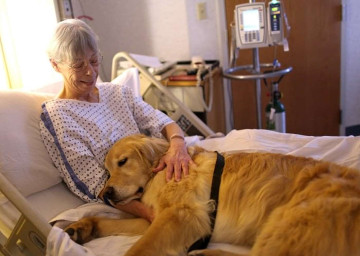Therapy Dog

Therapy Dog Information
Therapy Dog/handler teams volunteer their time and are beneficial in many different environments from library reading programs (kids can read to dogs to improve reading skills) to hospitals and nursing homes. Dogs may even help children and adults with physical therapy appointments for faster recoveries and lower university students' stress on testing days! Therapy work is an excellent fit for dogs and handlers that love interacting with new people.
Skye’s Dog Training offers training options such as group classes or private sessions to help clients reach their goals of becoming a Therapy Dog team.
The term “Therapy Dog” is frequently mistaken for “Emotional Support Animal” (sometimes called Companion Therapy) or “Service Dog”. To clarify, Therapy Dogs and their handler partners volunteer their time visiting institutions such as hospitals, libraries, nursing homes, etc.; they are not therapy dogs for their owners but rather for the public in the places they visit. Emotional Support Animals provide emotional support and comfort for their owners and are recognized under federal housing laws; they are not necessarily trained to perform a specific task for their owner and do not accompany the owner in public. Therapy Dogs are also sometimes mistaken for Facility Dogs. Facility Dogs accompany their handler at work (often in health care, legal and education settings) to assist the working handler’s clients.
Therapy Dog Training Program
Most clients will choose to works towards the goal of becoming a registered therapy team by taking a series of group training classes. Skye’s Dog Training suggests clients take Beginning Pet Manners, Intermediate, Advanced and then Therapy Prep to prepare to take the therapy test. Clients will often choose to take field trip classes as well to work on good public behavior.
Registration of Therapy Teams
The testing and registration of Therapy Dogs with a therapy organization is not required; however, most Therapy Dog/handler teams choose to be tested and registered with a nationally recognized therapy organization as many places where a therapy team may want to visit will require the team to be registered with a group. (Some nursing homes and other facilities do not require registration with an organization but it is a good idea for handlers to, at minimum, acquire insurance for their visiting Therapy Dog; most therapy organizations provide insurance for their registered teams.)
Because there are no national standards for Therapy Dog testing, and organizations can vary in their team requirements, Therapy Dogs are technically not “certified” (the term “certified” generally implies a national standard of testing), but rather “registered” with their therapy organization.
Skye’s Dog Training recommends that clients look into Utah Pet Partners (formerly Therapy Animals of Utah) as a therapy organization testing/registration option therapyanimalsutah.org. There are other therapy organizations as well; however, the Therapy Prep class is based after this group’s test, although the class would be helpful for clients to prepare for any therapy test. If clients choose to test through Utah Pet Partners, they will need to meet the organization’s testing requirements. Please see their website for more details.
Getting Started
If a client already has a dog that may be suitable for therapy work (at minimum, dogs considered for therapy should love meeting new people and be non-reactive and non-aggressive towards dogs), they may choose to start with one of these three options: 1) a one-hour evaluation of the dog with a private consultation at Skye's Dog Training facility in West Jordan, 2) an initial two-hour consultation/training session to address specific behavior issues, skills, problems, training plans or questions or 3) the group training class program.
Most clients choose to begin in the group class training program. If the client’s dog fits the standard group class requirements (non-aggressive and non-reactive towards people and other dogs, up to date on vaccinations or blood titers, 8 weeks old and up), they are welcome to start with group class training without an evaluation.
Skye’s Dog Training usually recommends that clients start in a Beginning Pet Manners group class (or private training) even if they have done training elsewhere since the methods used may not be the same or the topics may not have been covered in as much detail (or maybe not covered at all in previous training). The Beginning class is the most important class since we cover all the basics of how we will teach future skills. Something to keep in mind is that we will not cover anything from Beginning class in any other class. We may build on some skills, but the discussions of how to teach those skills will not be covered (since most clients will have taken the Beginning class first).
Sign up for a Therapy Dog Candidate Evaluation now!